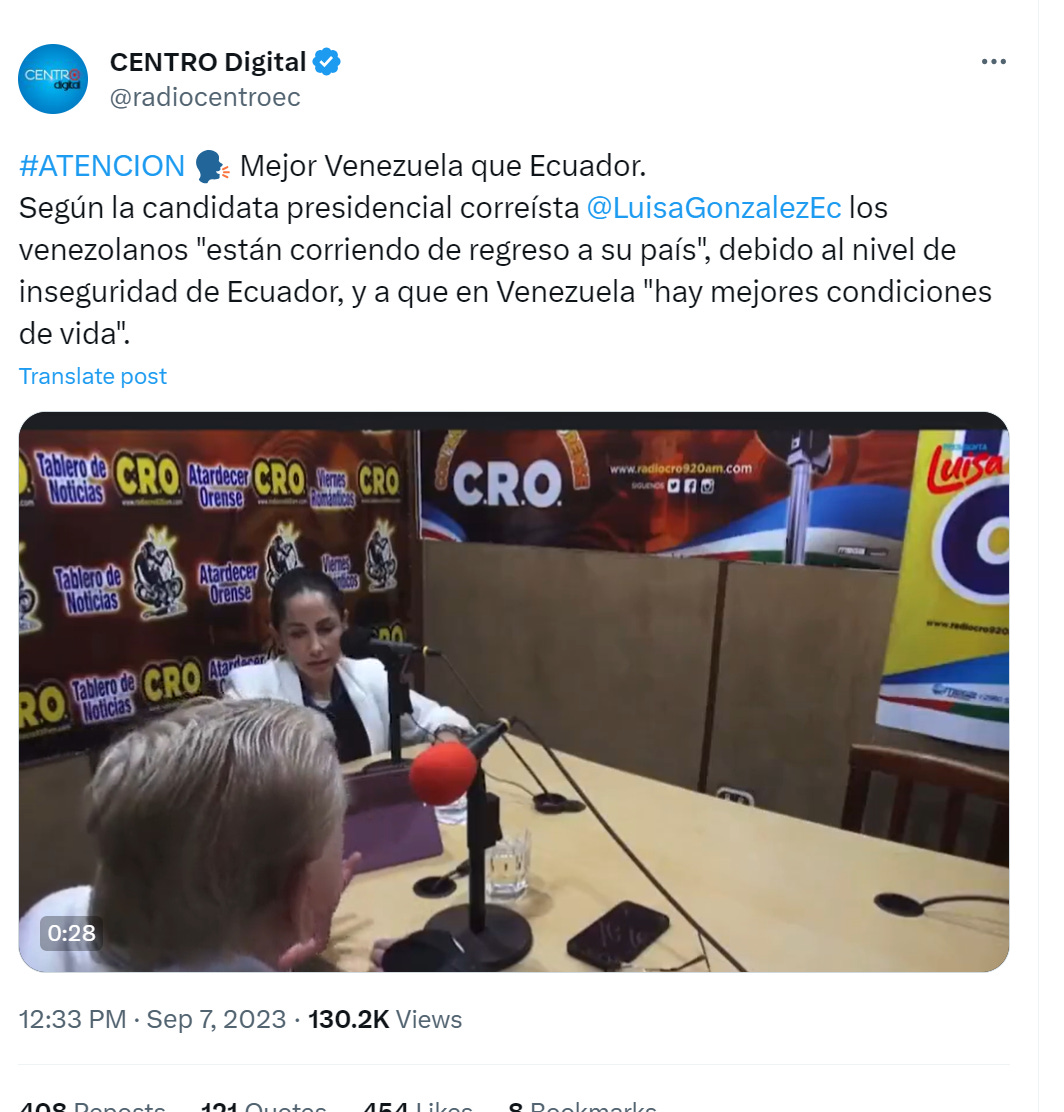Mrs. Luisa González, candidate for the Presidency for Correísmo (the so called “Citizen Revolution”), assured in an interview that “Venezuela has better living conditions” than Ecuador.
She said that Venezuelan migrants “are running back to Venezuela because it is safer than Ecuador (...). Venezuelans are running from Ecuador, they are terrified of Ecuador. They are going to Venezuela. Do you know why? Because Venezuela has better living conditions than Ecuador now”; this interview was on September 7, for Compañía Radiofónica Orense CRO 920 am.
To begin with, it is not true that Venezuelans are returning in large numbers to Venezuela. According to the Interagency Coordination Platform for Refugees and Migrants (R4V), 7.7 million emigrants have left the country, that is, ONE QUARTER of the population. In the last three years, the number of Venezuelans abroad has increased, particularly in Colombia and Peru. In Ecuador, according to the same source, the number of Venezuelans has increased from 385,000 in January 2020 to 475,000 in August 2023 (so not many “running back”).
Turning to the issue of insecurity specifically, as Luisa González mentions it, the homicide rate per 100,000 inhabitants was 40.4 in Venezuela and 25.9 in Ecuador, in 2022.
There are many factors that affect the quality of life. Venezuela's GDP per capita was estimated at $3,459 in 2022 (having fallen from $12,688 in 2012, a drop of almost 75% in 10 years). Ecuador's GDP per capita was $6,462 in 2022, that is, almost double that of Venezuela. In 2012, Ecuador's GDP per capita was $5,664, that is, it has increased by 14% in the same period.
Venezuela's poverty rate is a controversial issue. According to official figures, it is 50%, but according to the living conditions survey of the Central University of Venezuela, poverty reached 81.5% of the population in 2022 (having reached 94.5% in 2020), and extreme poverty 53.3% (having reached 76%).
In Ecuador, the poverty rate was 27% in June 2023, while extreme poverty was 10.8% on the same date. Poverty had reached a high of 33% in December 2020, and extreme poverty reached 15.4%. The poverty rate has dropped 16% between June 2021 and June 2023, a period that coincides with President Lasso's administration.
The minimum wage in Venezuela is equivalent to $4 per month in August 2023, much lower than that of Haiti and Cuba. In Ecuador the minimum wage is $450, although the median income is $300 (due to the existence of a large informal sector). In any case, Ecuador's minimum wage is 112 times higher than that of Venezuela, while if we take into account the average income, it would be 75 times higher.
Annual inflation was 2.56% in Ecuador in August 2023 (one of the lowest rates in Latin America), while that of Venezuela reached 422% on the same date (that is, 164 times higher).
Inflation is low in Ecuador mainly due to dollarization. Luisa González's running mate, Andrés Arauz, has indicated on three different occasions his interest in de-dollarizing Ecuador, and introducing "ecuadolars", a currency parallel to the dollar without any support.
In the case of Zimbabwe, which introduced the Zimdollar in 2019, the exchange rate increased from $1 Zimdollar per USD in 2019, to 1,000 per USD in the official market and 2,000 per USD in the parallel market. Dedollarizing would be the fastest way for Ecuador to reach the quality of life levels of Venezuela that Luisa González apparently longs for.




